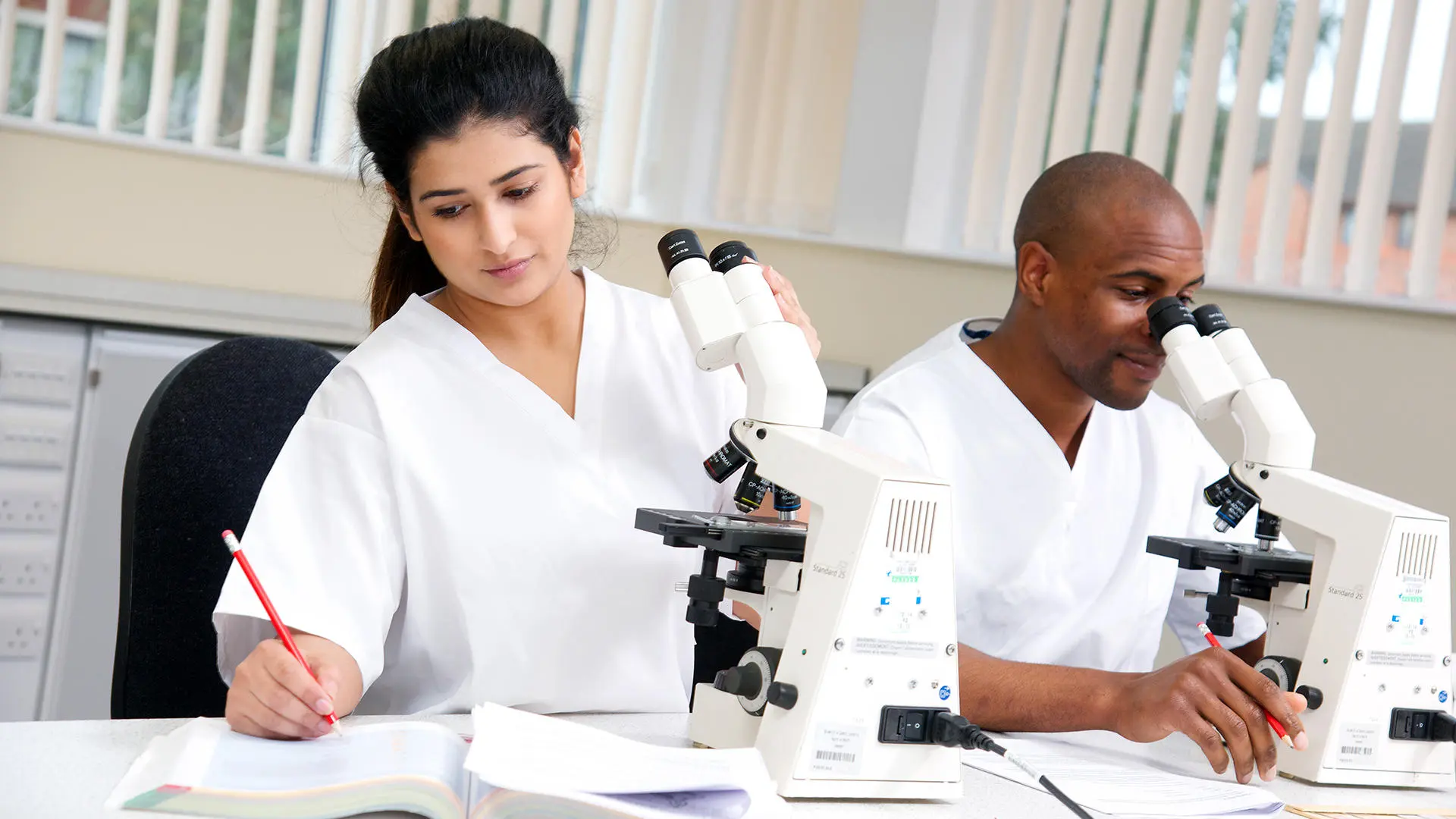Being a dermatologist can be a highly rewarding career. You play a vital role in diagnosing, treating, and managing conditions that affect the skin, hair, and nails.
As a dermatologist, you can choose to work within the NHS, private healthcare, research, medical education, cosmetic dermatology, and even within industries such as pharmaceuticals and aesthetics.
In this article, we’ll cover:
Key facts about becoming a dermatologist
- Salary: £38,831 from your foundation training up to £99,216 as a accredited specialty doctor. Consultants can earn even more in some cases. (NHS Careers)
- You can work for the NHS or in private healthcare. Salaries vary between the two.
- Becoming a pathologist takes between 13 to 15 years, depending on your chosen route.
- You'll work 38 to 40 hour weeks. You might be expected to work evenings, weekends and bank holidays.
- Dermatology is a very interesting and highly competitive field - having a successful career will require a lot of work.
What is a dermatologist?
A consultant dermatologist is a senior, fully qualified medical doctor who specialises in diagnosing and treating diseases of the skin, hair and nails. Dermatologists are experts in managing common and complex skin diseases, from acne and eczema to skin cancers and rare inflammatory conditions.
Dermatologists often work as part of multidisciplinary teams including oncologists, surgeons, paediatricians and general practitioners.
Why become a dermatologist?
Dermatology is one of the most diverse and in-demand medical specialties. Around half of all people are affected by a skin condition at any one time, meaning dermatologists play a crucial role in improving quality of life.
Dermatologists’ work is varied with over 2000 different skin conditions to diagnose and treat. As well as offering a range of treatments themselves, dermatologists treat all ages from babies to elderly patients and everyone in between.
What does a dermatologist do?
Dermatologists diagnose and treat all skin diseases and conditions. These can include:
- Common conditions such as acne, psoriasis and eczema
- Serious diseases such as melanoma and skin cancers
- Allergic and immune-related skin problems
- Skin infections and drug reactions
Treatments are varied and can include:
- Prescribing topical creams
- Oral drugs
- Phototherapy
- Cutting-edge injectable (biologic) treatments
- Advanced surgical procedures such as Mohs micrographic surgery for skin cancers
Due to the variety of the specialty and cutting-edge treatments, dermatology is the most competitive medical specialty.
Skills needed to become a dermatologist
To succeed in dermatology, you’ll need a combination of scientific knowledge, practical skills and strong interpersonal abilities:
- Excellent visual memory and visual pattern recognition
- Strong communication and empathy to support patients of all ages
- Precision and attention to detail for surgery and procedures
- The ability to balance medical, surgical and cosmetic aspects of care
Research and teaching skills are needed throughout your career to contribute to the wider field.
Education and training pathway
In the UK, becoming a consultant dermatologist requires you to become a doctor first, and then specialise in dermatology after that. This takes around 13 to 15 years.
Medical degree (5-6 years)
A medical degree is essential on your journey to becoming a dermatologist. You'll study this to be able to become a qualified and registered doctor in the UK.
Here at the University of Lancashire we have our MBBS Medicine & Surgery course. Our MBBS programme focuses on developing your expertise in a range of practical areas, including clinical, communication, observation, teamwork and leadership skills. It's the perfect way to start your career as a dermatologist.
Want to find out more about the process of becoming a doctor? We've written a helpful guide to explain the journey in full.
Foundation training (2 years)
On the UK Foundation Programme you'll complete two years of postgraduate training to become a doctor. You'll work in a variety of clinical settings such as hospitals and clinics. You'll work alongside clinical professionals to learn more about working as doctor.
You can find out more about the UK Foundation Programme by reading our 'How to become a doctor' guide.
Internal medical training (2 years)
Internal medical training is a two year long programme to further develop your skills in medical specialities. It's an essential part of becoming a dermatologist as you'll take and pass exams to earn your Membership in the Royal College of Physicians (MRCP).
You can find out more about the exams you'll take during this time on the Royal College of Physicians website.
You can also instead gain membership of the Royal College of Paediatrics and Child Health and move onto dermatology training, if you're more interested in paediatrics.
Dermatology speciality training (4-5 years)
Once you're a member of the RCP, or the RCPCH, you'll be able to complete your specialty training in dermatology. This involves taking training programmes to pass the Specialty Certificate Examination (SCE).
The Specialty Certificate Examination (SCE) is part of the assessment for Certificate of Completion of Training (CCT). Once you have your Certificate of Competition of Training, and you have passed your training period, you'll be eligible to become an accredited dermatologist.
Find out more
- Subject
Medicine
